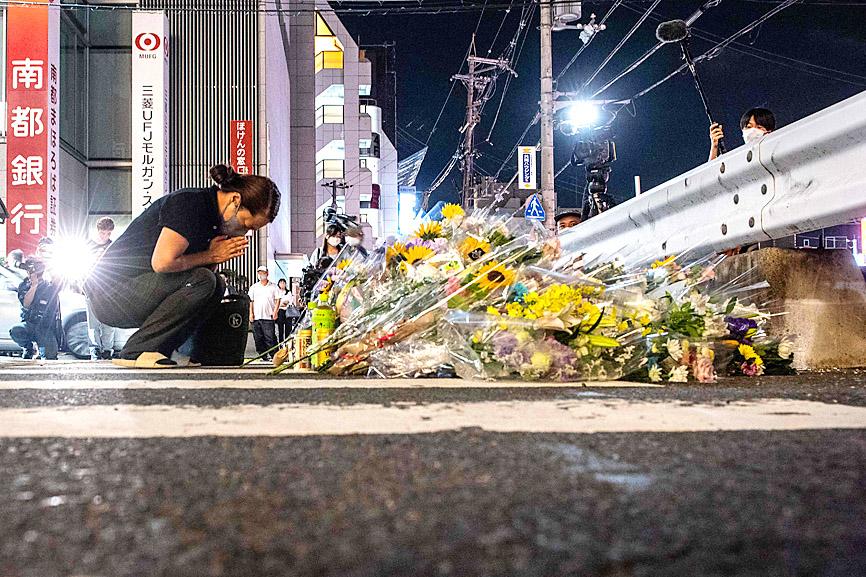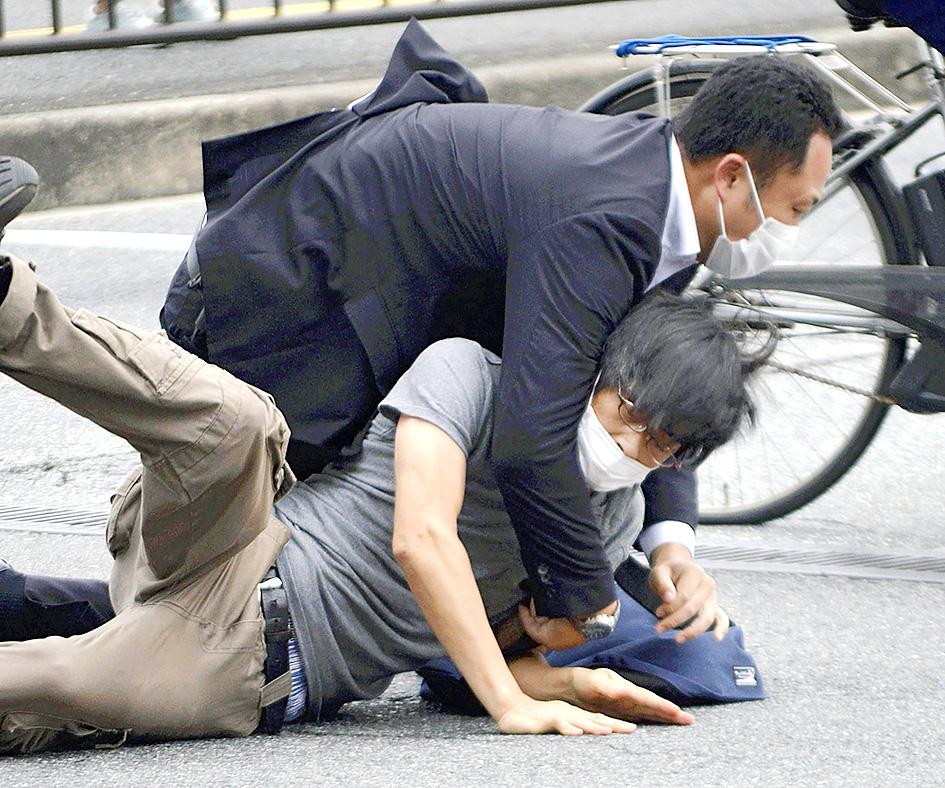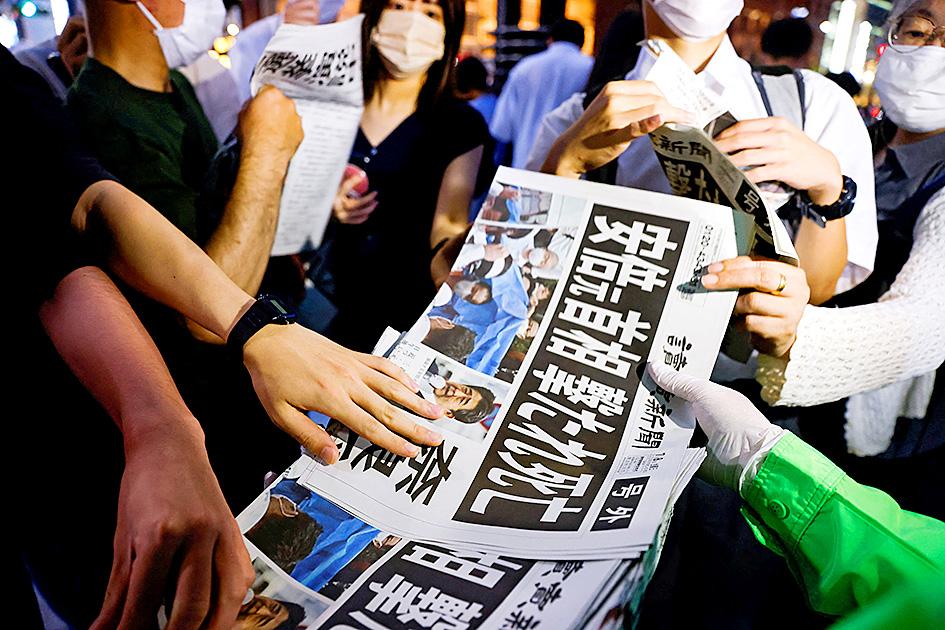Former Japanese prime minister Shinzo Abe was yesterday assassinated on a street in western Japan by a gunman who opened fire from behind as he delivered a campaign speech.
The 67-year-old Abe, who was Japan’s longest-serving leader when he resigned in 2020, collapsed bleeding and was airlifted to a nearby hospital in Nara, although he was not breathing and his heart had stopped.
He was later pronounced dead after receiving massive blood transfusions, officials said.

Photo: AFP
Nara Medical University emergency department director Hidetada Fukushima said Abe suffered major damage to his heart, along with two neck wounds that damaged an artery.
He never regained his vital signs, Fukushima said.
Police arrested the suspected gunman at the scene of the attack and identified him as Tetsuya Yamagami, 41, a former member of the Japanese navy.

Photo: AP
Broadcaster NHK reported that Yamagami said he wanted to kill Abe because he had complaints about him unrelated to politics.
Dramatic video from NHK showed Abe standing and giving a speech outside a train station in Nara ahead of tomorrow’s parliamentary election. As he raised his fist to make a point, two gunshots rang out, and he collapsed holding his chest, his shirt smeared with blood as security guards ran toward him.
Guards leapt onto the gunman, who was face down on the pavement. A double-barreled device that appeared to be a handmade gun was seen on the ground.

Photo: Reuters
Japanese Prime Minister Fumio Kishida and his Cabinet ministers hastily returned to Tokyo from campaign events around the country after the shooting, which he called “dastardly and barbaric.”
He pledged that the election, which chooses members for parliament’s less-powerful Japanese House of Councilors, would go on as planned.
“I use the harshest words to condemn” the act, Kishida said, struggling to control his emotions.
He said that the Japanese government planned to review the security situation, but added that Abe had the highest protection.
Even though he was out of office, Abe was still highly influential in the governing Liberal Democratic Party and headed its largest faction, Seiwakai.
Opposition leaders condemned the attack as a challenge to Japan’s democracy.
In Tokyo, people stopped on the street to grab extra editions of newspapers or watch TV coverage of the shooting.
When he resigned as prime minister, Abe said he had a recurrence of the ulcerative colitis he had had since he was a teenager.
He told reporters at the time that it was “gut-wrenching” to leave many of his goals unfinished.
He said he had failed to achieve a revision of Japan’s war-renouncing constitution, a goal that made him a divisive figure.
However, Abe said he was proud to have strengthened Japan’s security alliance with the US and shepherded the first visit by a serving US president to Hiroshima, one of two cities on which the US in World War II dropped an atomic bomb.
Serving as prime minister from 2006 to 2007 and from 2012 to 2020, Abe won six national elections and built a rock-solid grip on power, bolstering Japan’s role in the Indo-Pacific region. He also stepped up patriotic education at schools and raised Japan’s international profile.

A Ministry of Foreign Affairs official yesterday said that a delegation that visited China for an APEC meeting did not receive any kind of treatment that downgraded Taiwan’s sovereignty. Department of International Organizations Director-General Jonathan Sun (孫儉元) said that he and a group of ministry officials visited Shenzhen, China, to attend the APEC Informal Senior Officials’ Meeting last month. The trip went “smoothly and safely” for all Taiwanese delegates, as the Chinese side arranged the trip in accordance with long-standing practices, Sun said at the ministry’s weekly briefing. The Taiwanese group did not encounter any political suppression, he said. Sun made the remarks when

PREPAREDNESS: Given the difficulty of importing ammunition during wartime, the Ministry of National Defense said it would prioritize ‘coproduction’ partnerships A newly formed unit of the Marine Corps tasked with land-based security operations has recently replaced its aging, domestically produced rifles with more advanced, US-made M4A1 rifles, a source said yesterday. The unnamed source familiar with the matter said the First Security Battalion of the Marine Corps’ Air Defense and Base Guard Group has replaced its older T65K2 rifles, which have been in service since the late 1980s, with the newly received M4A1s. The source did not say exactly when the upgrade took place or how many M4A1s were issued to the battalion. The confirmation came after Chinese-language media reported

The Taiwanese passport ranked 33rd in a global listing of passports by convenience this month, rising three places from last month’s ranking, but matching its position in January last year. The Henley Passport Index, an international ranking of passports by the number of designations its holder can travel to without a visa, showed that the Taiwan passport enables holders to travel to 139 countries and territories without a visa. Singapore’s passport was ranked the most powerful with visa-free access to 192 destinations out of 227, according to the index published on Tuesday by UK-based migration investment consultancy firm Henley and Partners. Japan’s and

BROAD AGREEMENT: The two are nearing a trade deal to reduce Taiwan’s tariff to 15% and a commitment for TSMC to build five more fabs, a ‘New York Times’ report said Taiwan and the US have reached a broad consensus on a trade deal, the Executive Yuan’s Office of Trade Negotiations said yesterday, after a report said that Washington is set to reduce Taiwan’s tariff rate to 15 percent. The New York Times on Monday reported that the two nations are nearing a trade deal to reduce Taiwan’s tariff rate to 15 percent and commit Taiwan Semiconductor Manufacturing Co (TSMC, 台積電) to building at least five more facilities in the US. “The agreement, which has been under negotiation for months, is being legally scrubbed and could be announced this month,” the paper said,